A timepiece is more than just an accessory. It's a statement of style, a cherished possession, and for many watch owners, an extension of their personality. Like any worthwhile investment, keeping your watch in prime condition – glistening as if it were fresh out of the box – requires regular maintenance, and integral to that maintenance is cleaning. But how often should you clean your watch to keep it looking day one, every day?
This guide will provide comprehensive insights into why watch cleaning is so important, signs that your watch needs cleaning, how often different types of watches should be cleaned, and many other facets of watch care and maintenance. With our help, your precision timepiece will continue to dazzle and function with precision, removing the veils of time from your wrist accessory.
Why Is Cleaning Your Watch Important?
Do watches need to be cleaned?
Yes, they absolutely do. Just like our body, watches also absorb sweat, skin oils, and attract dirt. Moreover, dust and grime can accumulate in the hard-to-reach crevices, especially around the bracelet links and the crown. Unfortunately, all of this isn't just unsightly but can cause long-term damage to your watch. Regular cleaning is essential to the longevity of the watch, ensuring it continues to function correctly while also keeping it gleaming.
What are the risks of infrequent or improper cleaning?
Continual neglect on the cleaning front can lead to the accumulation of dirt and the eventual corrosion of metal parts. Imagine this: you wear your watch while eating, and unknowingly, bits of food make it their home. Over time, these tiny bits can develop nasty odor and might even harbor unwanted organisms. In extreme cases, internal components can get clogged, leading to performance issues.
Remember, dirt attracts moisture, which is the arch-nemesis of mechanical parts. Needless to say, a dirty watch also loses much of its aesthetic appeal, which is probably the last thing you want as a proud watch owner.
What Factors Determine the Cleaning Frequency?
The frequency of cleaning your timepieces largely depends on several fundamental factors. Let's look at them.
1. Type of watch
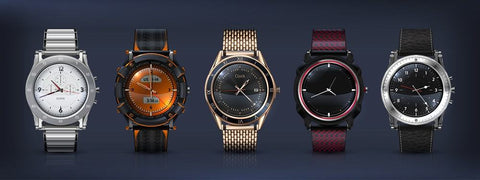
The type of your watch plays an important role in determining how often it needs cleaning. A robust, sporty watch may need frequent cleaning due to sweating and exposure to dirt, while a luxurious one might need periodic shining to retain its splendor.
2. Exposure to elements
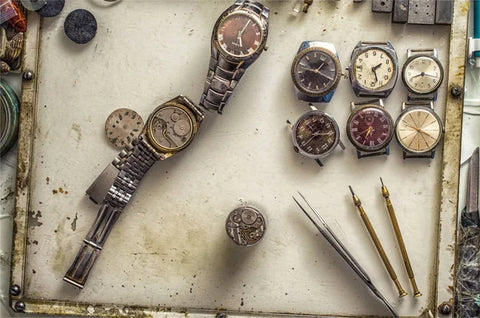
Consider your typical day wearing the watch. Are you stuck in an office cubicle, or do you often find yourself in an outdoor setting, exposed to dust and other elements? More exposure means more dirt and hence a higher cleaning frequency. A good rinse and wipe after a sweaty day or a dip in the pool can prolong the life of the watch.
3. Usage frequency and activity levels

If your watch never leaves your wrist, gather the cleaning supplies because you need to clean it often. Wearing your watch while working out, swimming, or any other strenuous activity calls for a thorough cleaning after each use.
How Often Should Different Types of Watches Be Cleaned?
Daily wear watches

If your watch is part of your daily wardrobe, it requires more frequent cleaning. Activities you undertake every day like working out could lead to a buildup of sweat, while tasks like eating could expose the watch to spills. Thus, a once a month cleaning regime is beneficial for a daily wear watch.
Additionally, a simple daily practice of wiping your watch down with a soft cloth can help maintain its new-like shine by removing potential dirt, oils, and sweat.
Occasional wear watches

These watches only see the light of day occasionally and spend most of their time tucked away safely. A gentle cleaning before and after wearing along with a professional servicing every 3-5 years should do the trick.
Second-hand watches
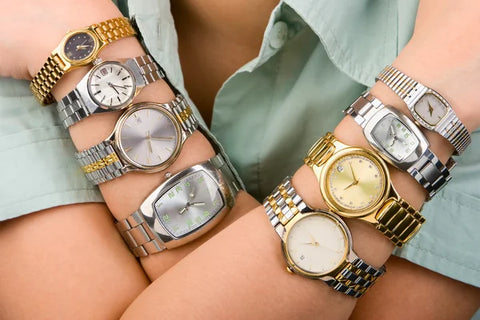
Always clean a pre-loved watch thoroughly before wearing. Depending on their condition, you might need a professional to service them as well.
Mechanical watches
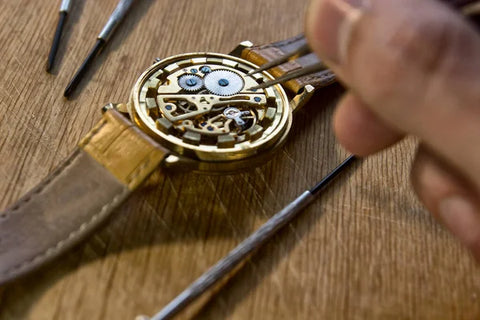
Mechanical marvels work best with professional care every 2-4 years. Remember, grit and grime can hinder the balance wheel and affect the watch's accuracy.
Quartz watches
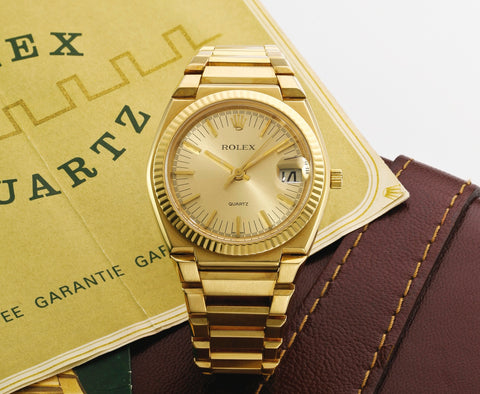
Image Credit: Time and Tide
Being battery-operated, quartz watches can go longer without cleaning—around 3-4 years. But they do appreciate a nice polish every year.
Luxury or collector's watches
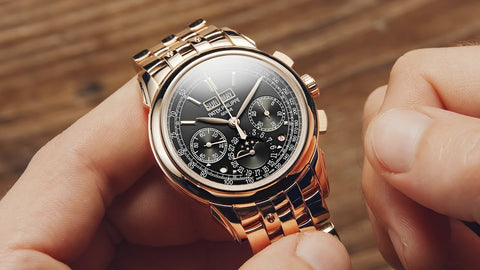
Image Credit: Watchfinder & Co.
These need to be babied with gentle and regular cleaning, ideally every six months. It is best to refer to their manufacturing guidelines before cleaning.
Sports and fitness watches

Keep them clean with every wear, especially if you have been sweating a lot or exposed them to dirt.
Dive watches

Image Credit: Josh Wussow
These should be rinsed with freshwater and dried properly after every dive to avoid corrosion, especially if they've been exposed to salt or chlorinated water.
Vintage watches
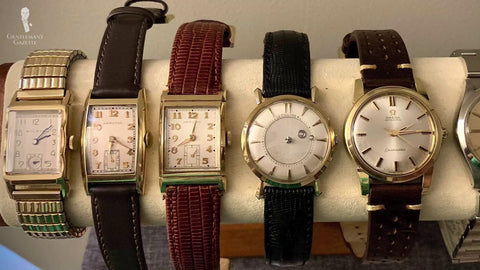
Image Credit: Gentleman's Gazette
Vintage watches require the gentlest care. It’s best to get them professionally cleaned and serviced rather than risking any damage with home cleaning. However, a light brushing every now and then may be permissible, depending on the watch's condition and material.
The golden rule? When in doubt, consult a professional and always follow the manufacturer's guidelines if available.
What Are the Signs That a Watch Needs Cleaning?
Knowing when your watch requires cleaning can be quite straightforward. Look out for these signs:
- Accumulated dirt or oils: If you see grime lodged in the tiny crevices of your bracelet or around the crown, it's time for a cleaning session.
- Discoloration or stains: Sweat, skin oils, and certain lotions or perfumes can discolor the strap of your watch over time. Metal straps may start to look dull or tarnished. These are clear signs that your watch needs cleaning.
- Unpleasant odours: Sometimes, you'll need your nose more than your eyes to alert you when your watch needs cleaning. If the strap starts to smell due to sweat and dirt accumulation, it's time to clean.
- Slow movement or stopped entirely: If your watch isn’t keeping time as accurately as before or it has stopped entirely, it could mean the internal parts are dirty or corroded, which would require professional cleaning.
What Are the Best Practices in Cleaning Watches?
Cleaning your watch can keep it ticking for years to come. The ideal cleaning, along with the frequency, largely depends on the type and condition of the watch.
What can I use to safely clean my watches?
Using a soft, non-abrasive cloth can remove dirt and smudges on the surface. Warm soapy water or a guaranteed safe watch cleaning kit designed for watches may be used for deeper cleaning. However, not all watches are water-resistant. Use specialized cleaning products and lint-free cloths for luxurious or vintage watches.

Should I clean my watch every day?
A daily quick wipe can keep your watch clean by wiping off body oils and sweat accumulated throughout the day. Apart from this quick clean, you may not need to clean your watch thoroughly every day.
Is it good to wipe watches every day?
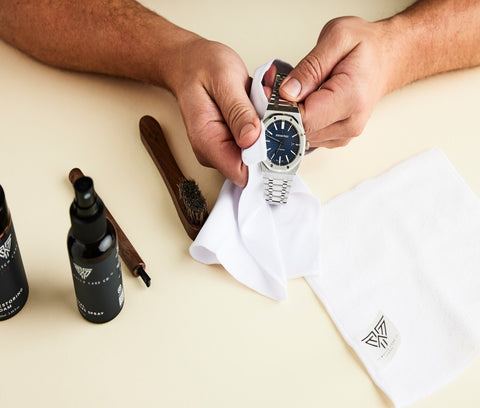
Wiping your watch every day with a microfiber cloth is a good practice to keep it gleaming and free from skin oils and everyday dust.
How often should you clean stainless steel watch?
You should clean a stainless steel watch ideally every two weeks to once a month to keep it shining and free from corrosion.
Is it OK to shower with a watch?

Image Credit: Time and Tide
While it might seem practical to keep your watch on while showering, it's typically not the best idea. Unless your watch is specifically designed to withstand water exposure (like dive watches or certain sports models), it's best to remove it before hitting the shower. Here's why:
- Water Pressure: Even if your watch is water-resistant to a great depth, the water pressure from a shower could still potentially harm it. This is because the water pressure in a shower can be much higher than what the watch is designed to resist.
- Temperature Changes: Taking a hot shower and then stepping into a cooler room creates sudden temperature changes that your watch may not handle well. The gaskets and seals in your watch can contract and expand due to these changes, leading to potential damage and water penetration.
- Soap and Shampoo: These shower essentials can have damaging effects on your watch as well. They can potentially wear down the gaskets and seals, and even accelerate the corrosion of metallic parts.
Thus, to keep your watch in good working condition for longer, it's recommended to remove it before you step into a shower.
Can you wear a watch in shower or bath?
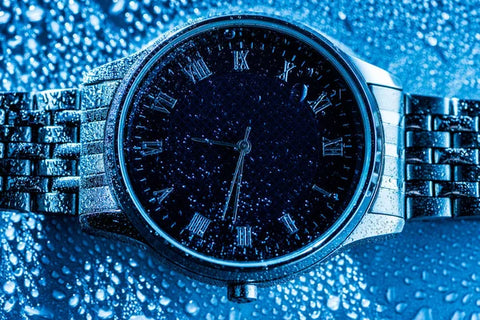
While wearing your watch in a shower or bath could be tempting, it's generally not recommended. Even though your watch may have a good water resistance rating—for instance, 50 meters or above—it's crucial to remember that these ratings signify the watch's ability to handle static water pressure. The dynamic water pressure from a direct showerhead can be much higher, potentially breaching your watch's defense.
Moreover, variations in temperature during a hot bath or shower may lead to the expansion and contraction of the watch's gaskets and seals, risking water penetration. Chemicals from soap or shampoo could also harm your timepiece by corroding the metal or degrading the seals.
So, if you cherish your watch and wish to prolong its lifespan and maintain its appearance, it's better to slip it off before stepping into the shower or bath. It's a small step, but it goes a long way in preserving your treasured timepiece.
Can you wear a watch every day?
Absolutely! However, if you do, remember that it will require more frequent cleaning to prevent dirt buildup and skin irritation.
How long should a watch last you?
With proper care and cleaning, a high-quality watch can last for decades, often becoming treasured heirlooms passed through generations.
Are Professional Cleanings Necessary?
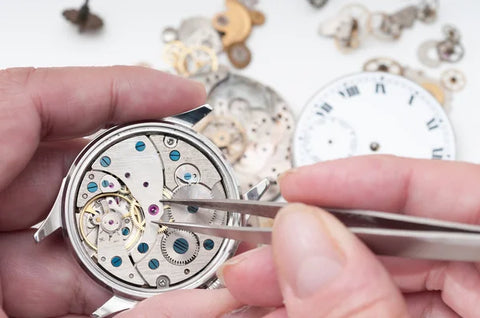
Maintaining your timepiece with routine cleaning can often eliminate the need for costly professional services. It's also a time-efficient solution, sparing you from waiting periods associated with professional cleanings. However, it's worth noting that professional cleaning can indeed prolong the lifespan of your watch, keeping its internal mechanisms in optimal condition.
Benefits of professional watch cleaning
Professional watch cleaners take apart the watch, clean each part individually, and then reassemble it. They also lubricate the movement, replace worn out parts, and conduct accuracy tests, ensuring that your watch works as well as it did on day one.
Determining when to seek professional help
You should seek professional help if you spot any signs of troubles like fogging underneath the crystal, inaccurate time keeping, or any damages on the watch. Also, if you have a luxury or vintage watch or one that's water-resistant, it's best to have it professionally cleaned and maintained.
Potential drawbacks of neglecting professional cleanings
Neglecting professional cleanings can compromise the functionality of your watch and shorten its life. Dirt and grease buildup can corrode parts, altering timekeeping accuracy and in severe cases, stopping the watch altogether.
How to Store a Watch to Minimize Cleaning?
Proper storage reduces your cleaning frequency and keeps your watches in optimal condition.
Best practices for storing daily-worn watches
Store your daily-worn watches away from sunlight, which can fade the dial and strap over time. Also, protect them from dust by storing them in a cloth pouch or durable watch cases or boxes.
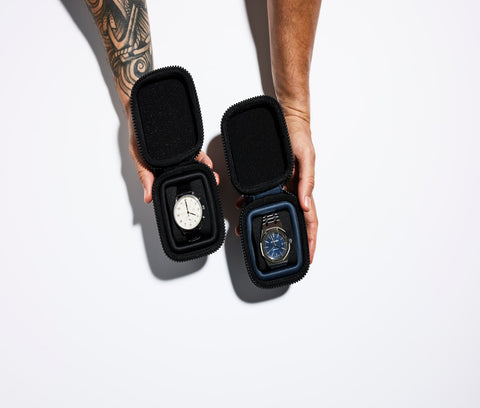
Tips for long-term storage of occasionally-worn or specialty watches
For watches that aren't worn frequently, it's best to store them in watch storage with pillow inserts. These holders maintain the shape of the bracelet or strap. Remember to pull out the crown to the time-setting position for mechanical watches to save on power.

For dive watches and other water-resistant watches, ensure the crown is secured to maintain the water resistance. Avoid storing watches in areas with high humidity or temperature extremes.
Conclusion
There is no denying that cleaning and caring for your watch, whether it's a daily wearable or an occasional splendor, is the cornerstone in maintaining its beauty and value. Simple habits, such as wiping it down regularly and getting it professionally serviced every few years, can go a long way in ensuring your timepiece ticks with the same zeal and allure as on the day you first wrapped it around your wrist. Thus, by respecting your watch's specific needs and treating it to regular TLC, you are not just preserving a time-telling instrument–you are upholding a timeless possession designed to resonate with your personal story, journey, and style.


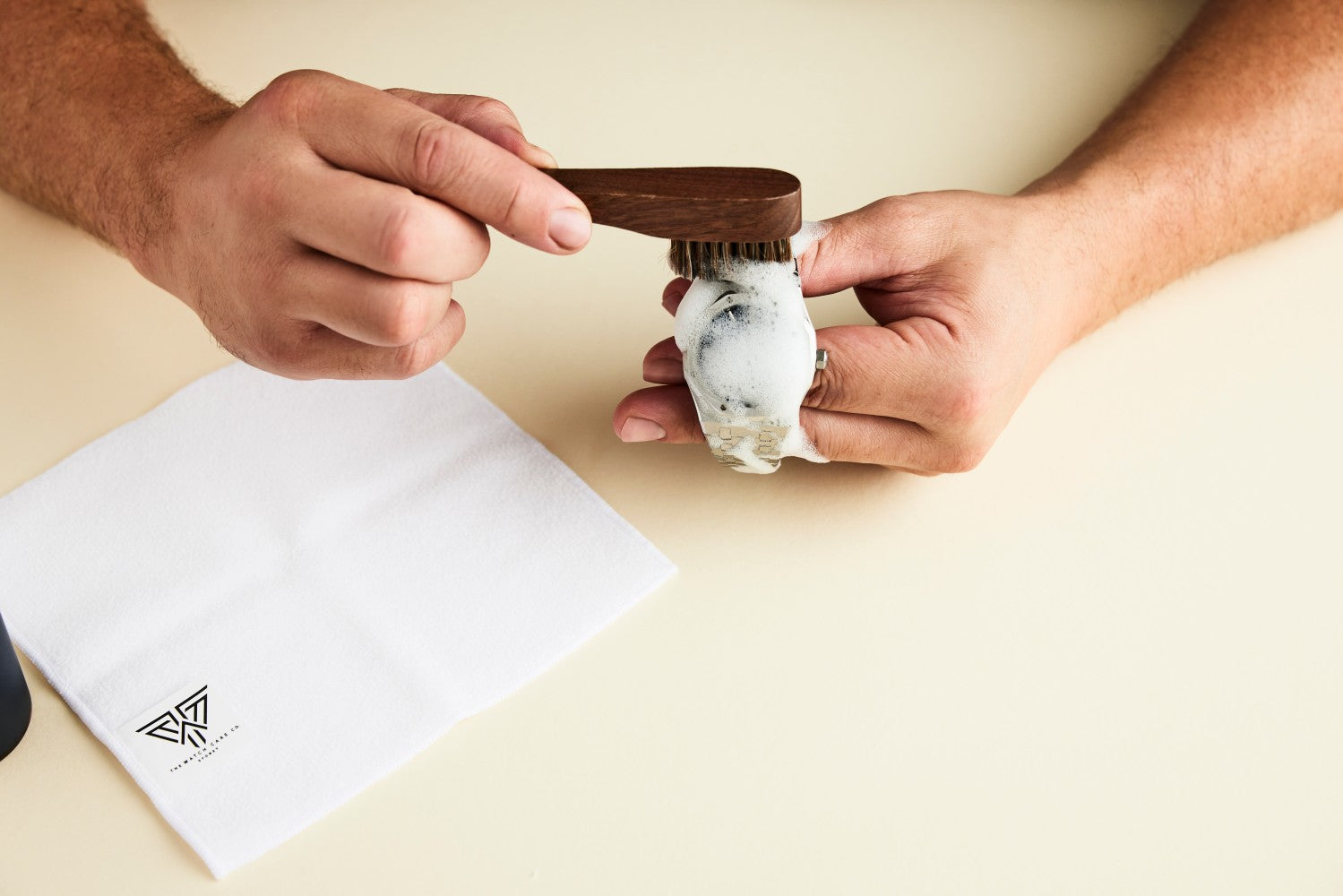
Share:
How to Properly Take Care of Your Luxury Watch
The Ultimate Guide for Taking Care of All Types of Watches